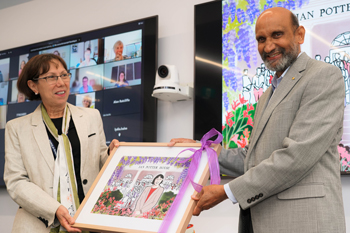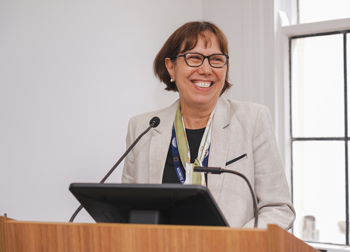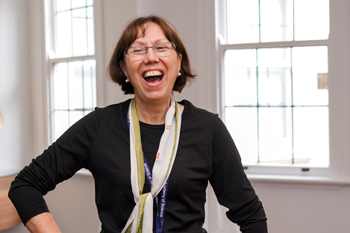After decades supporting Australian science internationally, Nancy Pritchard says her work isn’t done yet—noting there are challenging times ahead with the region’s shifting geopolitics.

At an event this week to acknowledge Nancy’s 30th anniversary as an Australian Academy of Science staff member and her significant contributions to science, Academy President Professor Chennupati Jagadish AC said the organisation owed Nancy a debt of gratitude.
“With her deft interpersonal and diplomacy skills, Nancy has built far-reaching and productive working relations with public servants, science diplomats and international science organisations over many years,” Professor Jagadish said.
“Her tireless efforts have strengthened scientific links between Australia and the global community.
“Nancy understands better than most that science has no national boundaries, and that by continuing to work together we can make progress addressing the global problems faced by society and the planet.
“We sincerely thank Nancy for her contributions and look forward to continuing to work with her.”
Nancy began her career at the Academy in 1992. Her first role was with the Academy’s fundraising arm, the Australian Foundation for Science.
“It was during this time that the Academy secured funding to restore the Shine Dome: a $1 million donation from Professor John Shine AC FAA FRS and a $525,000 grant from the National Council for the Centenary of Federation,” Nancy said.
Nancy took on the role of managing the Academy’s international scientist exchange program in 2000.

She continues in that role today, which has expanded to include promoting Australia’s international scientific engagement and overseeing the Academy’s many awards and the work of the National Committees for Science.
The work has seen her travel to many countries to support and promote bilateral and multilateral scientific partnerships, including Mongolia, Nepal, Brazil, Indonesia, China, Japan, Malaysia, Sri Lanka, Singapore, France, England, Turkey and Vietnam.
She said Australia hosting the high-profiile ‘International Day’ for the first time at the annual Lindau Nobel Laureates Meeting in Germany in 2014 stands out in her mind.
“It was a great showcase of Australian science, cultural and educational achievements, spearheaded by three of Australia’s Nobel Laureates, to an audience of 600 young researchers from 60 countries.”
Nancy has worked under nine Academy presidents and watched the organisation grow from 18 to 70 secretariat staff.
“It has been an extremely fulfilling role in which I have made great friends. I just love what I do, particularly working with our Fellows and my secretariat colleagues who are amazing people and are all passionate about the mission. That rubs off on you,” Nancy said.
“Just like the Fellowship, the Academy’s secretariat is now a much more diverse workplace than when I started.”

Reflecting on her time at the Academy, Nancy said the establishment of the International Science Council’s Asia-Pacific Regional Focal Point at the Academy, announced late last year, was a personal highlight.
“Another highlight has been my involvement with the Association of Academies and Societies of Sciences in Asia (AASSA) Women in STEM special committee chaired by Professor Cheryl Praeger AC FAA.
“It has been a privilege to work with outstanding women scientists from the region who have faced major challenges and made sacrifices to get to where they are now. I still stay in touch with them.”
Academy Chief Executive Anna-Maria Arabia said Nancy is a national treasure.
“The Academy and Australian science are so fortunate to have benefited from Nancy’s expertise and tireless commitment to advancing science domestically and internationally,” Ms Arabia said.
“I congratulate Nancy on this significant milestone and very much look forward to continuing to work together for many years to come.”
Looking to the future, Nancy said increasing school science education globally is a common topic of discussion at the international meetings she attends.
“More than anything, the learned academies want more school science education to happen in their respective countries.
“Our Academy does that well—through programs including Science by Doing, Primary Connections and Resolve. That is something the Academy and Australia should be proud of,” Nancy said.
“International science is also changing, in part because of the geopolitical issues facing the region. But you cannot do science without international collaboration. Continuing to build trust between researchers and scientists across the globe, as we navigate these geopolitical issues, is crucial for the future of the planet.”

© 2025 Australian Academy of Science